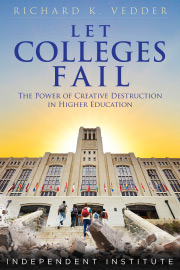Besides climbing walls and fancy housing, any college or university wanting to compete in the academic arms race for students must offer attractive study abroad programs.
Originally a province of foreign language students or a modest number of affluent young people, study abroad is viewed as a necessity, and a number of schools require some education abroad.
For example, the business school at my midquality state university (Ohio University) pressures all its students to have some foreign exposure, although some programs are short—a few weeks in length.
Falling transportation and communication costs have greatly expanded international economic and cultural interchanges, and it’s hard to be against young Americans’ exposure to non-U.S. culture. My wife and I have led student educational tours or study programs in Europe frequently over the last 44 years.
Yet some reasons for student foreign travel are questionable on both educational and economic grounds. Study abroad is a marketing tool and in some cases a cash cow for universities. Educationally, the programs have long had a reputation for offering little intellectual content or academic rigor, and minimal language or cultural immersion.
A Financial Racket
American schools occasionally make arrangements with an institution in a foreign country, collect the American tuition fee, and sometimes additional state government subsidies. For all the talk about promoting global awareness and cultural diversity, these programs are arguably a financial racket. They free up space in dorms and classrooms on the home campus for other “customers,” and are a marketing tool to convince parents (sometimes incorrectly) that their children are getting a superior education.
Unfortunately, the pressures to study abroad are only increasing. Employers are starting to expect that experience to appear on resumes of college graduates. It’s part of the same credential creep that saw employers put “college degree preferred” on postings for low-skill positions—bartenders, janitors and the like—to help winnow down the applicant pool to manageable size. Jobs that might have required a basic degree—as in occupational therapy, or elementary school teaching—prefer or may demand a master’s degree, or even doctorates.
On the whole, we are raising the cost of becoming eligible for managerial, technical and professional jobs that historically have gone to college graduates. Even within the spectrum of college graduates, relatively poor or middle income graduates of state schools increasingly compete for mediocre jobs, while those attending elite private schools or who augment their education with expensive overseas programs are given an advantage that on objective grounds based on the student’s inherent talents and past performance are not truly justified.
In cases where language proficiency plays a big role, and where foreign study is a serious exercise in cultural and language immersion, the study abroad experience has some justification, and a number of colleges are trying to improve their programs. Yet government data show that fewer than 6 percent of study abroad students major in foreign languages, and that slightly over 20 percent of them come from each of three areas: business, social sciences, or non-foreign-language humanities or fine arts majors.
Social Education
But I think the major reason for the boom in study abroad enrollments is simple: College today is as much a socialization experience as a learning one, and relatively affluent students, and even less affluent ones who pile up big student debts, spend six months or a year in cool foreign locales, away from prying parents or university officials, having lots of fun. If it’s possible to judge from the drinking habits of many students I’ve seen on short overseas tours, this entertainment dimension of higher education can trump learning.
Surveys show the average college student spends less than 30 hours weekly on academic pursuits, often for 30 weeks a year. My observation is that this problem is magnified when relatively lightly worked students are put in a foreign country with limited pressures to perform academically.
Should students be able to borrow money from the U.S. government, when the government in turn borrows some of the funds from Chinese and other investors to finance these junkets overseas? Federal student debt now exceeds a trillion dollars, so the padding of these numbers by foreign study programs may have broader macroeconomic implications on already stressed federal finances.
At a time when we are straining to meet our entitlement and other obligations, we should scrutinize the efficacy of these programs. Where are the accrediting agencies—are they certifying these programs achieve true academic goals?
If accreditation boards will not assume responsibility, how about having an organization like the Educational Testing Service or ACT give standardized country-specific examinations to returning students, measuring their knowledge of the country visited, with significant financial consequences to the school if students show little or no learning?
The time has come to analyze this use of educational resources dispassionately, using honest assessments of the costs and benefits.












